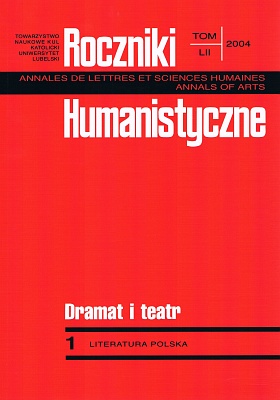Theatrical Problems in Wilhelm Feldman's Writings
Abstract
The article is devoted to the connections of Wilhelm Feldman (1868-1919) with the theatre, as these problems take up especially much space in his research works: Feldman was a historian of the theatre and of theatrical criticism; he also regularly published reviews and reports of the activities of the contemporary stages. He treated the theatre as an important place in which national culture was created and propagated. It seemed to him especially important in the situation when Poles – who were under the influence of the three invading states – were exposed to the threat of losing their national identity. In his works of the history of the theatre (including the history of Polish theatres from positivism to the contemporary times) he paid a lot of attention to analysis of the theatres' repertoire and the way the plays were produced, to the actors' art and the audience's expectations from them. Feldman not only commented on the manifestations of the theatrical life but also made suggestions for changes in the way Polish theatres worked – from which his conception of the “Polish theatre” may be reconstructed. The theatre was to be based on dramas that had high literary values – contemporary and classical, Polish and foreign ones. Also actors, talented and forming good companies, were tobe a foundation of it. Each premiere – according to Feldman – should be connected with preparation of a separate set of scenery, costumes, special effects and music, so that it would reflect the peculiar atmosphere of the produced dramatic work. Efficient work of a theatre – in the opinion of the author of Contemporary Polish Literature – also depends on the work of critics, the audience's expectations and the financial policies of the municipal authorities; hence, he demanded that they assumed a mature and responsible attitude. A theatre organized in this way, headed by a creative individual, accessible not only to elites but to the whole society, would be a Polish contribution to European culture.
Copyright (c) 2004 Roczniki Humanistyczne

This work is licensed under a Creative Commons Attribution-NonCommercial-NoDerivatives 4.0 International License.





